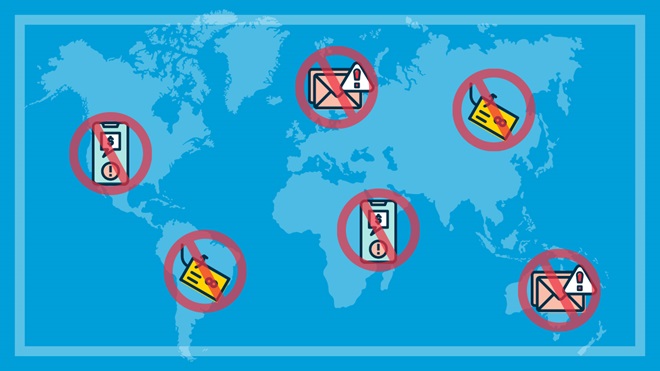It's gotten to the point where we can't go online anymore without seriously worrying about – or actually getting – scammed.
It doesn't help that the internet has no geographical boundaries, and that the scammers don't either.
According to a Global Anti-Scams Alliance report from November 2023, over a quarter of the citizens across 43 countries around the world had lost money to a scam in the previous 12 months, adding up to a tidy $1.026 trillion.
In 2022, Australians lost about $3.1 billion to scams, many of which were executed on the world's biggest digital platforms, such as Facebook, Instagram and Google.
Which is why CHOICE has teamed up with over 20 consumer groups from 19 countries in a joint international statement calling on governments to require social media and other tech companies to do a lot more than they're currently doing to prevent their users from being scammed.
A plan to block scams
The joint global statement lays out a blueprint for stopping the scammers from hijacking the platforms we use every day. It includes:
- better verification of apps, advertising accounts and ads to make sure they haven't been set up by scammers
- better monitoring systems to flag suspicious activity and clear reporting channels for users to report scams
- the swift removal of fraudulent accounts and ads
- accessible and effective support for scam victims.
When you compare Australia's $3.1 billion (about USD$2 billion) in scam losses in 2022 to Canada's and New Zealand's losses over the same period (USD $394 million and USD $123 million, respectively), it seems clear Australia is in the firing line.
"The UK has already passed laws requiring technology platforms to prevent fraudulent scam ads, and Australians are currently missing out on these protections," says Soderlund.
"We're looking forward to engaging with the Australian government's recently announced consultation to make sure there are strong rules backed by significant penalties in Australia too."
Nine out of 10 call for penalties
Australians overwhelmingly think the tech titans should be held accountable.
A recent national CHOICE survey found that nine out of 10 people think digital platforms that fail to detect and prevent scams should face serious penalties.
Most also think these platforms aren't going to do enough to protect us unless the government forces them to.
In our survey, 88% said the platforms currently are not doing enough, and the same percentage said they believed the platforms aren't going to take effective steps to protect us unless there are laws that say they have to.
In Australia, losses reported to Scamwatch from scams on social media have increased to over $66 million in 2023, an increase of more than 40% on the same time period in 2022
CHOICE senior campaigns and policy adviser Alex Soderlund
"Tech giants such as Facebook, Instagram and Google are failing to prevent scammers from using their platforms to target victims, causing enormous amounts of harm to consumers globally," says CHOICE senior campaigns and policy adviser Alex Soderlund.
"In Australia, losses reported to Scamwatch from scams on social media have increased to over $66 million in 2023, an increase of more than 40% on the same time period in 2022."
Read the full international anti-scams statement and add your name here.
Stock images: Getty, unless otherwise stated.



